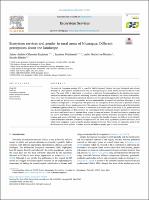Mostrar el registro sencillo del ítem
Ecosystem services and gender in rural areas of Nicaragua: Different perceptions about the landscape
| dc.contributor.author | Cifuentes-Espinosa, Jaime A. | |
| dc.contributor.author | Feintrenie, Laurène | |
| dc.contributor.author | Gutiérrez-Montes, Isabel A. | |
| dc.contributor.author | Sibelet, Nicole | |
| dc.date.accessioned | 2022-02-03T21:32:03Z | |
| dc.date.available | 2022-02-03T21:32:03Z | |
| dc.date.issued | 2020 | |
| dc.identifier.uri | https://repositorio.catie.ac.cr/handle/11554/11581 | |
| dc.description.abstract | The study of Ecosystem services (ES) is a prolific field of research. Despite the great biological and cultural diversity, in Latin America, research in this field has been growing at a much slower rate than in the rest of the world. The study of ES is called upon to contribute to informed decision-making for the planning and conservation of the territory and to improve well-being. However, this can only be achieved if the various stakeholders’ vision about their environment is considered, since they are the ones most impacted by such decisions. Our study was carried out in nine rural communities in three municipalities in central and northern Nicaragua, a rural country with high rates of rural poverty. We questioned the perceptions of rural land uses as providers of ES by rural communities, from a gender perspective. We addressed this question from the framework of the Sustainable Livelihoods Approach (SLA) that allowed us to interrelate such diverse topics as the study of ES, gender and land uses. In each community, we first requested the endorsement of the community leaders, and then we carried out semi-structured interviews and separate focus groups for men and women. We used participatory mapping and the pebble distribution method (PDM), to identify how gender identity influences perceptions about benefits, location, and access to ES. Both men and women recognized the benefits of nature but differed in the identification of land uses that most provide ES. Exceptions were the forest areas, agroforestry systems and rivers, all of which were recognized as providing the greatest amount of services. These results are especially useful in the development of public policies to reduce poverty and address gender gaps in rural communities. | es_ES |
| dc.format.extent | 11 páginas | es_ES |
| dc.language.iso | en | es_ES |
| dc.relation.ispartof | Ecosystem Services, 50 | es_ES |
| dc.relation.uri | https://doi.org/10.1016/j.ecoser.2021.101294 | es_ES |
| dc.subject | BIODIVERSIDAD | es_ES |
| dc.subject | TOMA DE DECISIONES | es_ES |
| dc.subject | PLANIFICACIÓN | es_ES |
| dc.subject | COMUNIDADES RURALES | es_ES |
| dc.subject | UTILIZACIÓN DE LA TIERRA | es_ES |
| dc.subject | SOSTENIBILIDAD | es_ES |
| dc.subject | SISTEMAS AGROFORESTALES | es_ES |
| dc.subject | CURSOS DE AGUA | es_ES |
| dc.subject | POLÍTICAS PÚBLICAS | es_ES |
| dc.subject | NICARAGUA | es_ES |
| dc.subject.other | Sede Central | es_ES |
| dc.title | Ecosystem services and gender in rural areas of Nicaragua: Different perceptions about the landscape | es_ES |
| dc.type | Artículo | es_ES |
| dc.creator.id | Jaime Andrés Cifuentes-Espinosa https://orcid.org/ 0000-0003-4744-1607 | es_ES |
| dc.identifier.status | restrictedAccess | es_ES |
| dc.subject.sdg | ODS 13 - Acción por el clima | es_ES |


